 COMPUTING
COMPUTING @ UCLAN CYPRUS
 COMPUTING
COMPUTING
Computing and especially software is eating the world: the largest bookseller (Amazon), the largest video service (Netflix) the largest marketing & business intelligence company (Google) are all software companies1.
Computing includes the top 3 skills required to succeed in the future working environment: Complex Problem Solving, Critical Thinking and Creativity. It is also thought to be the top industrial sector for 2020, as claimed by the highly acclaimed World Economic Forum.2
The demand for computing professionals is high, greatly exceeding the supply. This has triggered initiatives such as the CodeWeek in Europe and the Hour of Code in the United States with the aim of encouraging more young students to take an interest in coding. Our staff have also launched the highly successful Code Cyprus initiative to promote the value of coding & computing in Cyprus.
JOB SATISFACTION
EMPLOYMENT
SALARY
The Computing programme at UCLan Cyprus offers some unique advantages:
A range of careers opens to students upon completion of their degree. These include roles in business requirements analysis, design and development of database-backed systems, development of web and mobile applications, computer games development, system testing and management, wired and wireless networks management, network security, and many more. Moreover, the broad skills that our students acquire enable them to remain competitive in the fast evolving area of computing technology.
The BSc(Hons) Computing enables you to specialize in:
 Our programme is accredited by the British Computer Society (BCS) and our graduates receive the title of Chartered IT Professional (CITP).
Our programme is accredited by the British Computer Society (BCS) and our graduates receive the title of Chartered IT Professional (CITP).
Get the BSc(Hons) Computing factsheet
Watch the short video Study Computing at UCLan Cyprus (33 seconds).
Check the university website for more details
This course enhances students' employment prospects in the IT field, and further develops the skills they obtained in their undergraduate degree. The skills acquired can lead to a range of careers in computing specialisations that are in high demand even outside the technology sector, such as networks and IT security.
Specializations in:
Get the MSc Computing factsheet
Check the website for more details
Typically, Cybersecurity professionals can be employed by telecommunication, IT and technology companies, network operators and network equipment vendors, consultancy agencies and government departments, as well as any other organisation that needs to protect its IT infrastructure and operations. Cybersecurity is part of nearly every discipline from defence and intelligence to healthcare and aerospace.
Also available as Distance Learning.
Get the MSc Cybersecurity factsheet
Check the website for more details
This course is designed to provide graduates and working professionals with skills that enable them to organise, analyse, explore, interpret and visualise their data, as well as acquire practical experience with modern tools. These skills can be used in virtually every industry domain that uses data, such as Banking, Consumer, Healthcare, Energy, Manufacturing, Technology, etc. Additionally, the course provides a multitude of career options in both national and international data analytics companies.
Get the MSc Data Analytics factsheet
Check the website for more details
Our programme is delivered by a blend of tenured faculty and associate lecturers. This allows us to deliver a programme that builds on the best from both academia and industry. The academic faculty involved in the delivery of the BSc(Hons) Computing programme are:
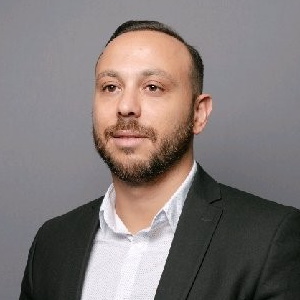
Assist. Prof. Louis Nisiotis, Ph.D., Fellow HEA — Course leader of BSc Computing
LNisiotis at uclan.ac.uk ·
2469 4144 ·
web ·
room #126 ·
orcid
VR/AR/MR/XR, Immersive Learning Technologies, Cyber-Physical-Social-Systems.

Assist. Prof. Andrie Piki, Ph.D., Assoc. Fellow HEA — Deputy course leader of BSc Computing
APiki at uclan.ac.uk ·
2469 4067 ·
web ·
room #126 ·
orcid
Educational Technology, Instructional Design, and Academic Writing.

Prof. Irene Polycarpou, Ph.D., Fellow HEA — Rector
IPolycarpou at uclan.ac.uk ·
2469 4048 ·
web ·
room #133
Educational technologies, Interactive multimedia for education, Instructional software, Participatory software design, eLearning, Computer Science curriculum, Student cognition and learning styles, K-12 mathematics and STEM education.
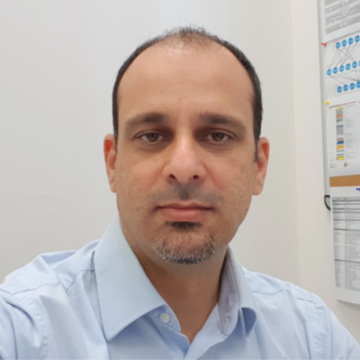
Prof. Nearchos Paspallis, Ph.D., Fellow HEA — Head of School of Sciences
NPaspallis at uclan.ac.uk ·
2469 4091 ·
web ·
room #141 ·
orcid
Software engineering and distributed systems, Mobile and pervasive computing systems, Gamification as a means for student engagement and behaviour change, Responsible Research and Innovation.

Assoc. Prof. Panayiotis Andreou, Ph.D., Assoc. Fellow HEA — Course leader of MSc Data Analytics
PGAndreou at uclan.ac.uk ·
2469 4085 ·
web ·
room #141 ·
orcid
Data Management for Systems and Networks, Information Systems, Adaptive Computing, ICT services for eHealth and Ambient Assisted Living, Adaptive Systems.

Assoc. Prof. Josephina Antoniou, Ph.D., Fellow HEA — Course leader of MSc Computing and MSc Cybersecurity
JAntoniou at uclan.ac.uk ·
2469 4094 ·
web ·
room #137
Decision-Making for Problem-Solving using Game Theory, Baeysian Principles and Cooperative Strategies, Cloud Computing, Quantification of user experience, Science in education, Responsible Research and Innovation in ICT.

Assist. Prof. Christiana Ioannou, Ph.D.
CEAIoannou at uclan.ac.uk ·
2469 4046 ·
web ·
room #141
Cybersecurity, Internet of Things.

Assist. Prof. Christoforos Christoforou, Ph.D.
CChristoforou2 at uclan.ac.uk ·
2469 4090 ·
web ·
room #126
Mobile Cellular Networks.

Andria Procopiou, Ph.D. — Deputy course leader of MSc Cybersecurity
AProcopiou at uclan.ac.uk ·
2469 4031 ·
web ·
room #126
AI in Sport Injuries, Sports Analytics, Hate Speech Detection and Analysis, Security, Privacy and Safety in the Metaverse, Explainable Artificial Intelligence, Cybersecurity and Privacy in Smart Cities/IoT.

Andreas Savva, Ph.D.
ASavva3 at uclan.ac.uk ·
2469 4034 ·
web ·
room #125
Many-core Architectures, Networks on Chip and ways of minimizing power consumption in networks and reliability, Uses of Artificial Neural Networks for prediction, Performance improvement of overlay networks with caching algorithms.

Christoforos Charalambous, Ph.D., Assoc. Fellow HEA
CCharalambous at uclan.ac.uk ·
2469 4171 ·
web ·
room #126
Video Analytics, Computer Vision, Human Motion Analysis, Business Intelligence, Smart City, Biometrics, Security, Crime Forensics.
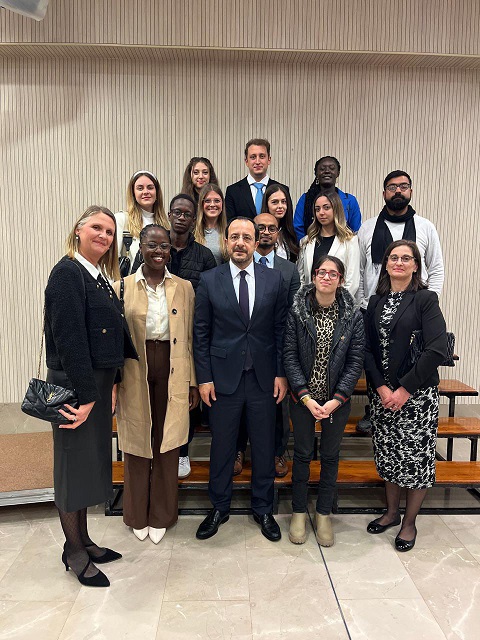


We had the honour of visiting the Presidential Palace and meeting the President of Cyprus, Mr Nikos Christodoulides, during the United Nations Human Rights event. The experience underscored the importance of international cooperation, in promoting human dignity and equality. We are grateful for the opportunity to engage in meaningful dialogue and contribute to advancing human rights. We look forward to future events that foster collaboration and drive positive change globally.
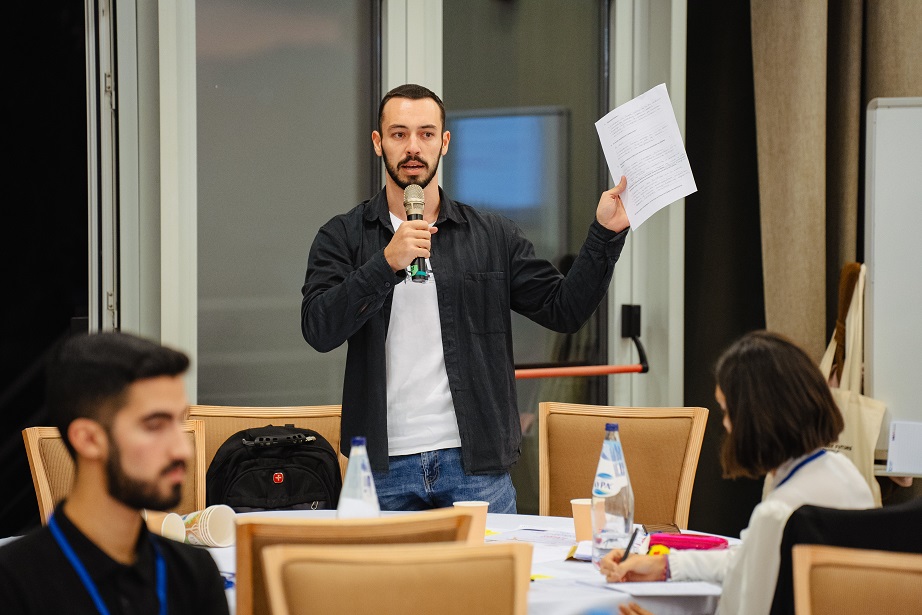
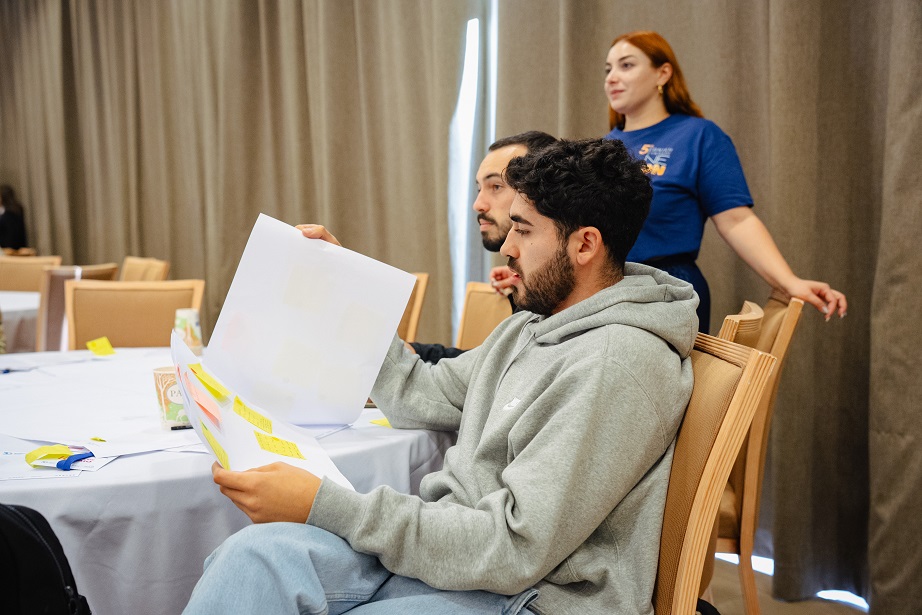 BSc (Hons) Computing students Kyveli Christoforou,
George Lazari, and
Panagiotis Hadjidemetriou were amongst the participants at the
5th National Youth Conference, 'Act with a Plan', meeting with other young people and state officials
at the Presidential Office on 19th November 2024. With the participation of the President of the
Republic of Cyprus, Mr Nikos Christodoulides, the event marked a milestone in youth policy, shaping
the National Youth Strategy 2030.
BSc (Hons) Computing students Kyveli Christoforou,
George Lazari, and
Panagiotis Hadjidemetriou were amongst the participants at the
5th National Youth Conference, 'Act with a Plan', meeting with other young people and state officials
at the Presidential Office on 19th November 2024. With the participation of the President of the
Republic of Cyprus, Mr Nikos Christodoulides, the event marked a milestone in youth policy, shaping
the National Youth Strategy 2030.
The Youth Board of Cyprus organized another successful National Youth Conference, 'Act with a Plan,' where I had the honor of participating. Around 200 people of different ages and backgrounds came together to exchange views on various issues young people face in our country and to propose reforms to existing laws. The event took place at the Presidential Palace, where Mr. Nikos Christodoulides, the President of the Republic of Cyprus, was present to answer questions and receive suggestions. My team was tasked with proposing ideas on how to increase employment and entrepreneurship among the young population. A big thank you to our advisor, the event organizers and UCLan Cyprus for giving me this incredible opportunity!
I feel very lucky that I participated in this event. We met a lot of people and made connections including students from other universities from various fields but also professionals from the industry. More specifically we had to work with our team to find ideas for managing issues about employability and present them so they can be considered as options for future use by the government. Moreover, we had the chance to talk to the President of Cyprus and the Minister of Education and ask questions regarding the Cypriot educational system and suggest ideas of how it could be improved or address issues that we have encountered.
We are extremely proud for our BSc (Hons) Computing students Kyveli Christoforou, George Lazari, and Panagiotis Hadjidemetriou who were amongst the participants at the 5th National Youth Conference, 'Act with a Plan' serving as active agents contributing to the betterment of our society.
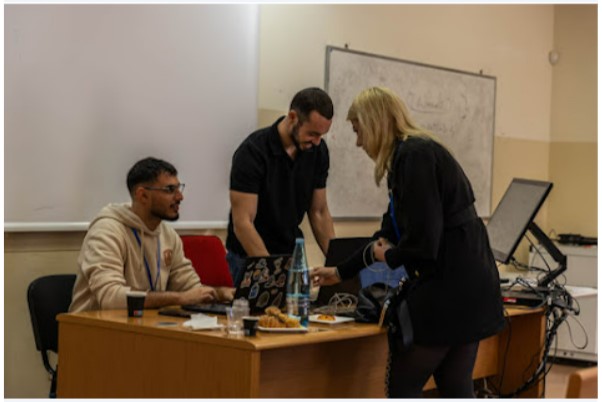
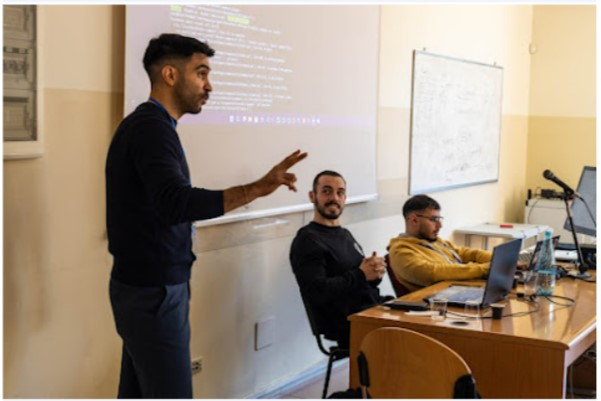
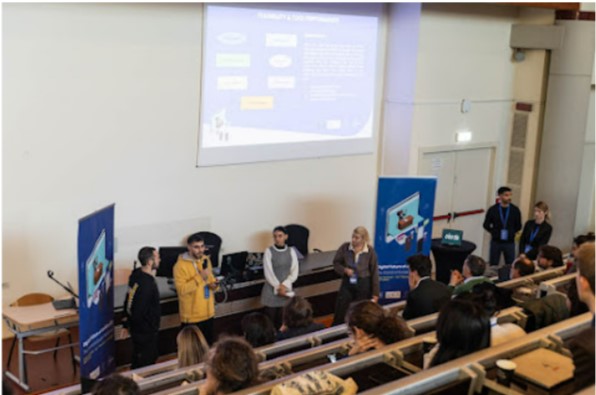 Two students from BSc Hons Computing, Marios Philippou and Panagiotis Hadjidemetriou were members of the
interdisciplinary team representing UCLan Cyprus during Digital Future of Justice 2.0 - The Council of Europe Hackathon, held on 15-17 November 2024 in Bologna.
Two students from BSc Hons Computing, Marios Philippou and Panagiotis Hadjidemetriou were members of the
interdisciplinary team representing UCLan Cyprus during Digital Future of Justice 2.0 - The Council of Europe Hackathon, held on 15-17 November 2024 in Bologna.
...During the weekend on 15/11-17/11, I had the amazing opportunity to attend a Hackathon in Bologna, Italy and represent Team Cyprus. The Hackathon was called “Digital Future of Justice 2.0”. The participating teams had to create an innovating solution to automate the process of comparing and finding similar law cases with the power of AI. [...] The competition was very challenging due to the little amount of time we had to complete it. After working tirelessly through the night we managed to pull through with a finished product. The team consisted of two Software Developers and 2 Lawyers. The combination of knowledge from both sides gave the team insights from both fields on how the app should work, since the app was supposed to be used by lawyers. Overall, it was an amazing experience to work with such talented professionals, and make strong connections in the field. I gained a lot of new skills and I hope to be fighting for the top spot in the next Digital Future of Justice!
My team and I built a fullstack web-application that utilizes an NLP model pretrained on hundreds of thousands of law cases called LegalBERT. The frontend of the application was built with Angular, and the backend technology connecting the frontend with the model was a FastAPI application built with Python. Docker was used to put everything together in a container that could be run on different environments and operating systems without dependency issues. Additional features were Translation and Graphs & Visualized Data. As a Proof of Concept, a database could be implemented to keep track of past searches and fetched cases. Additionally the NLP model can be even more fine-tuned to even more law cases.
The hackathon was a great opportunity to rapidly develop new skills and make lots of new friends. It was fun and I would definitely do it again!
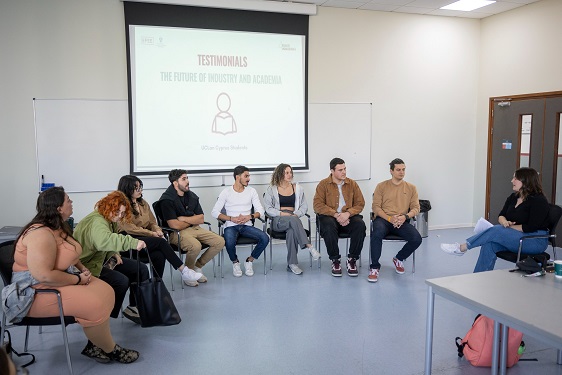 UCLan Cyprus students were invited to a session on 'The Future of Industry and Academia'. Three of our BSc (Hons) Computing students, Panayiotis Theodorou, Antoniy Serdyukov, and George Lazari, participated in a panel discussion and shared their views and experiences through academic life and internships in the industry.
UCLan Cyprus students were invited to a session on 'The Future of Industry and Academia'. Three of our BSc (Hons) Computing students, Panayiotis Theodorou, Antoniy Serdyukov, and George Lazari, participated in a panel discussion and shared their views and experiences through academic life and internships in the industry.
It was very interesting to hear from fellow students at the university from various fields like Psychology and Business Administration on examples of activities or projects in their classes that made them directly interact with the industry. Moreover, we talked about the process of starting from just a small groupwork of a class assessment to building important soft skills that make you stand out to be a top candidate for a job opening in the industry.
The session by the HigherED4Industry, provided us with a strong stepping ground in order to discuss and delve into the future of the relationship of the industry and academia.
The session gave me the insight on how I need to approach my next steps as i work in the industry, and how to elevate academia to secure a healthy and highly placed position. I believe that the future of the industry and academia, is closely intertwined as many new topics emerge which require much research, such as AI. Therefore, it is instrumental that individuals try to combine the both to enhance the opportunities that can be created from such combinations.
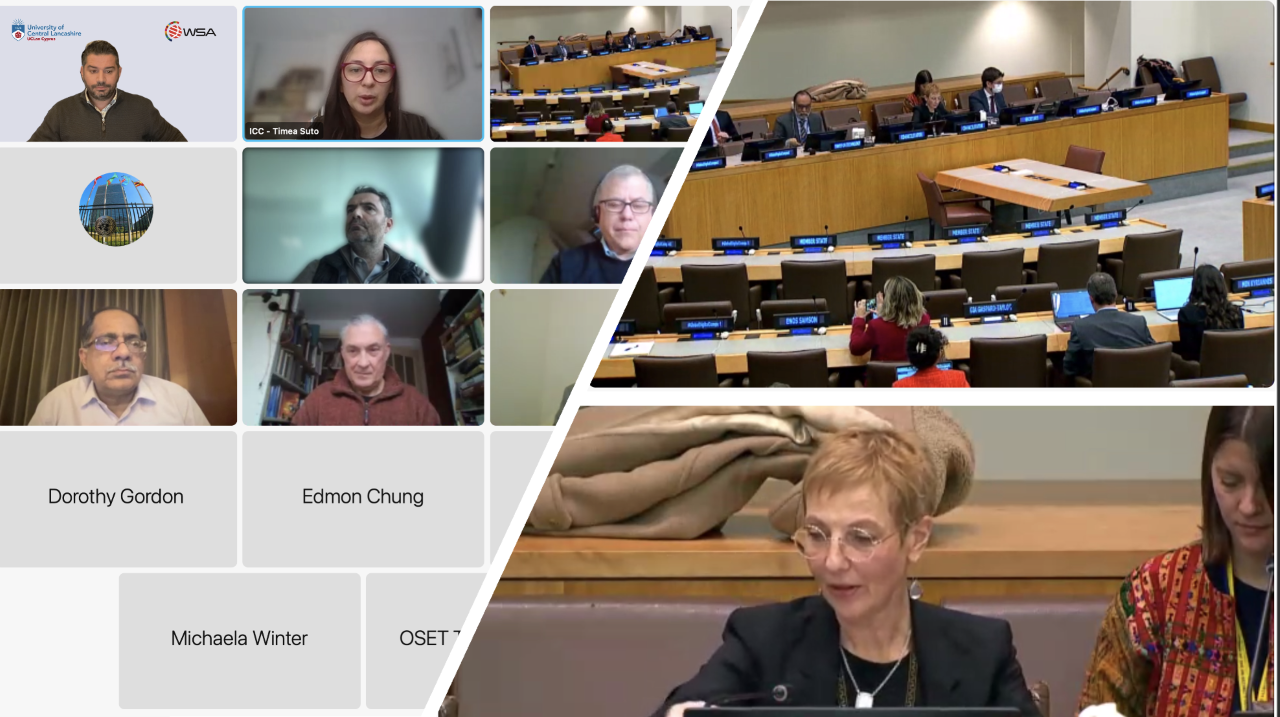
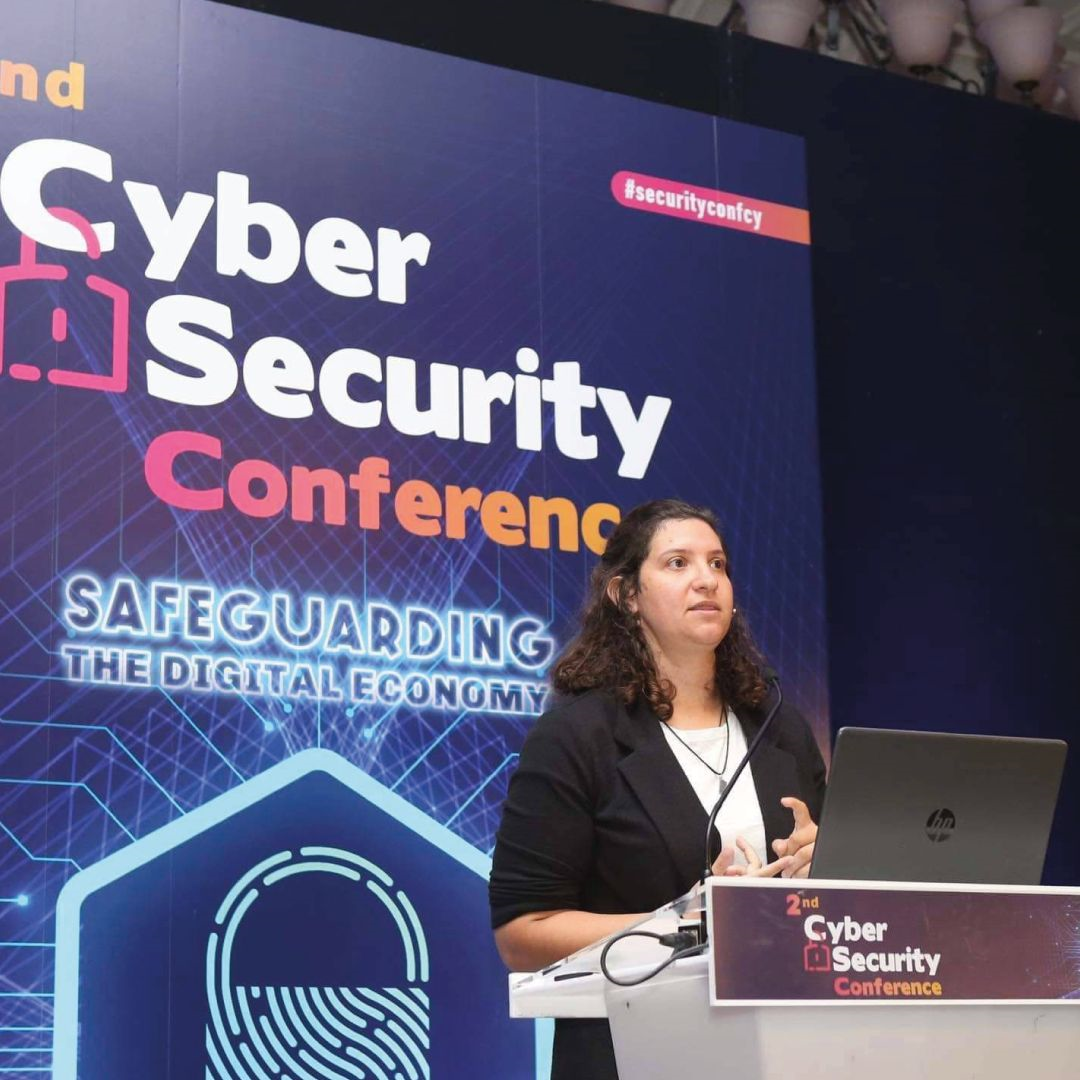

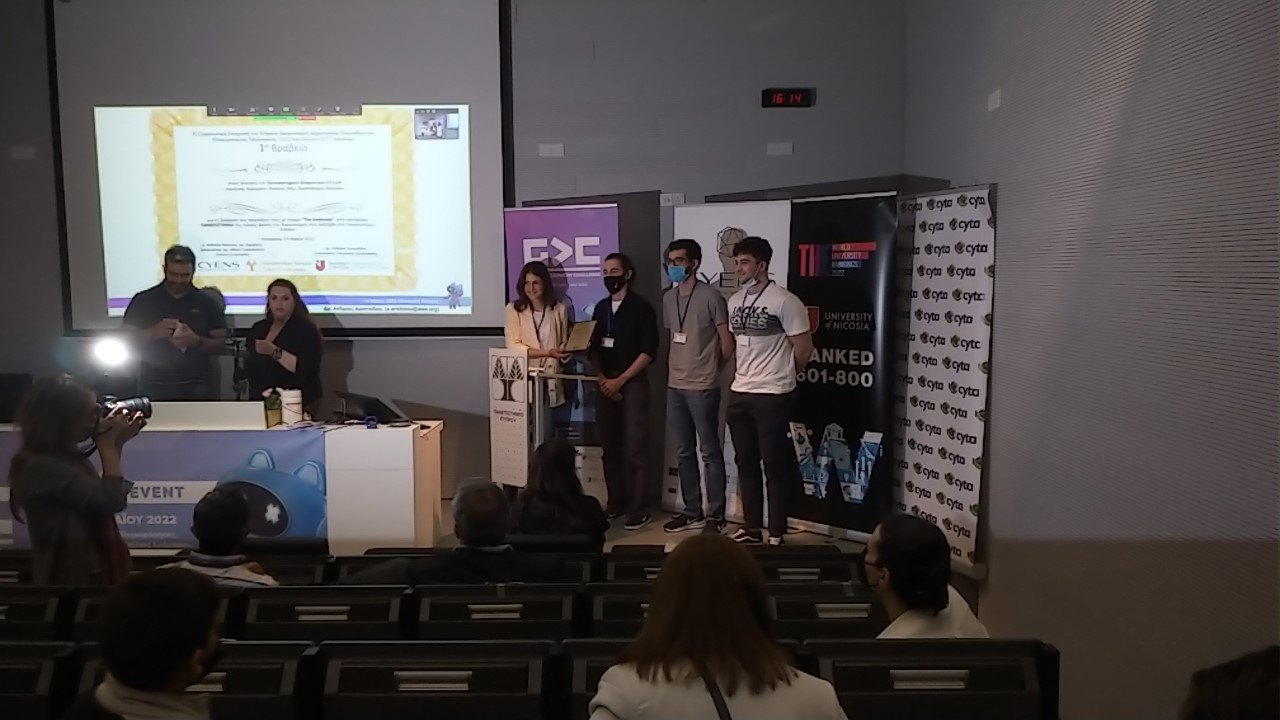

Studied BSc(Hons) Computing
Works at Nielsen, Rotterdam

Studied BSc(Hons) Computing
Works at Microsoft, Copenhagen

Studied BSc(Hons) Computing, MSc Cybersecurity
I selected to study BSc Computing because nowadays it is needed in every type of industry. Furthermore, studying computing has helped me build logic and problem solving skills. I unreservedly recommend UCLan Cyprus to everyone interested to study computing.
Studied MSc Computing
Worked at Amazon, Prague
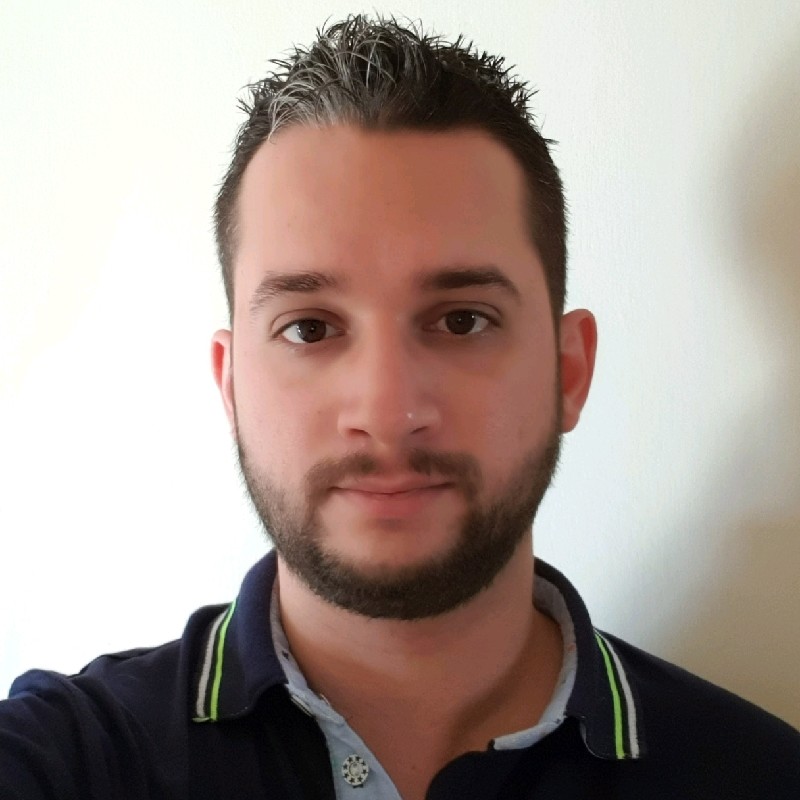
Studied BSc(Hons) Computing
PhD Candidate at UCLan, Received thesis award from CYO

Studied BSc(Hons) Computing
Cyprus student rep at GEANT

Studied BSc(Hons) Computing
PhD Student at UCLan, Researcher at InSPIRE

Studied MSc(Hons) Computing
Works at HS Data Ltd, Nicosia

Studied BSc(Hons) Computing
PhD Student at UCLan, Studio Manager at Rays and Vectors Game Studio

Studied BSc(Hons) Computing
Junior Software Developer at iSPIRAL

Studied BSc(Hons) Computing
Full Stack Developer at Silversky3D
UCLan Cyprus is a Cyprus-licensed university and closely affiliated with the University of Central Lancashire in the United Kingdom.
The award-winning campus13 of UCLan Cyprus is located in Pyla, Larnaca, approximately 500 meters from the Larnaca-Ayia Napa highway, near exits 59 and 60.
Driving time is 20 min for Larnaca International airport (LCA) or downtown Larnaca, 30 minutes for the beautiful beaches of Ayia Napa, and 40 minutes for the capital city, Nicosia.
Would you like to learn more about Computing at UCLan Cyprus?
Stop by for a cup of , or send us an email to arrange an appointment.